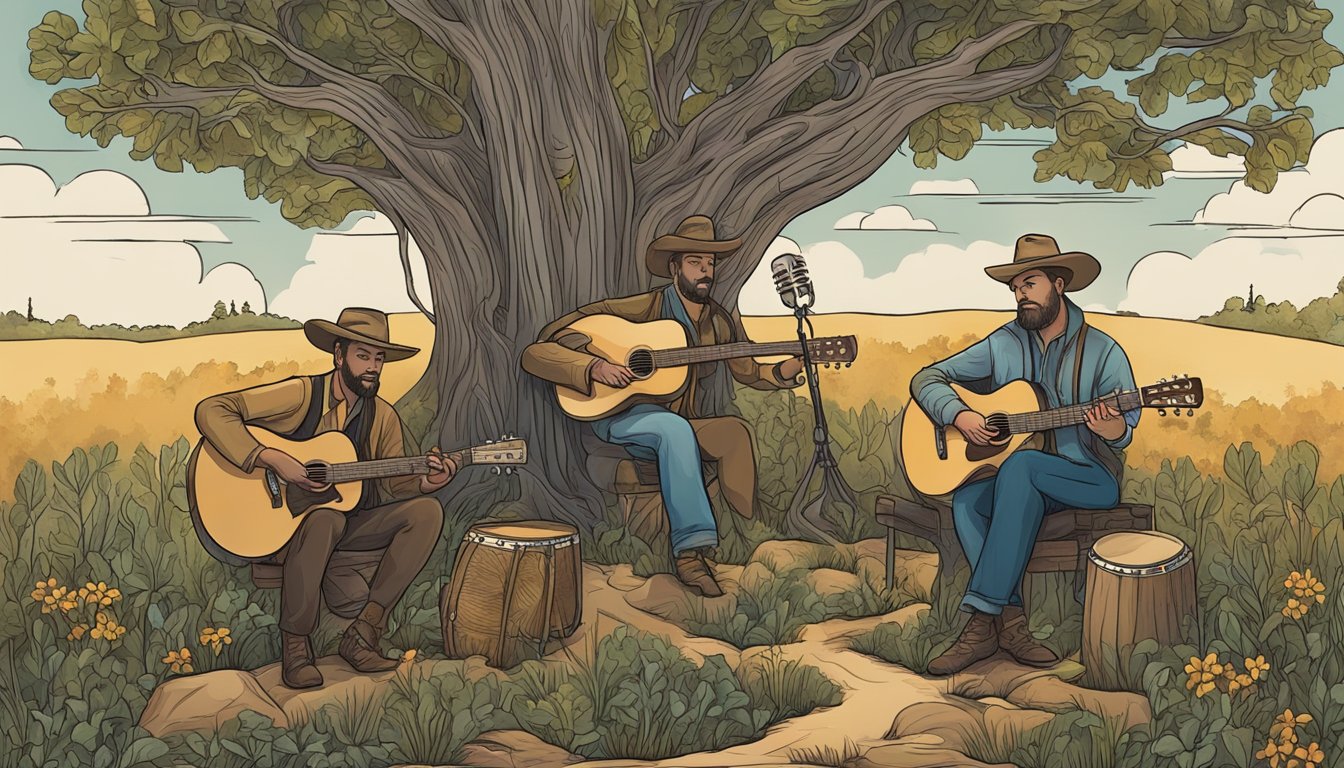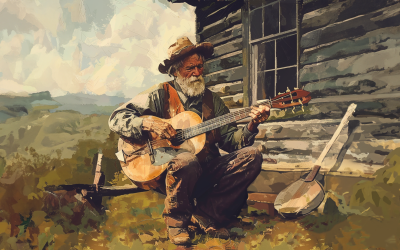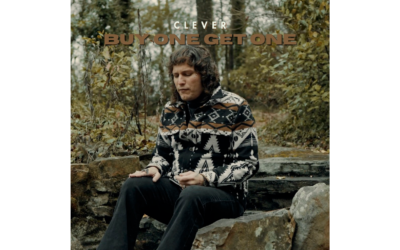Roots music is a diverse and fascinating genre that encompasses a variety of traditional and regional styles. Blending elements of early blues, country, and rhythm and blues, roots music has evolved over time to encompass a wide range of contemporary sounds and styles. The history of roots music dates back to the early 20th century, drawing from the deep well of cultural and geographical roots found in America’s diverse regional folk music scenes.
By exploring the roots of America’s rich musical history, you can gain a deeper appreciation for the soundscapes that have shaped the nation’s cultural fabric. This article delves into the world of roots music, exploring its origins, different styles, and prominent artists. In doing so, we’ll uncover a few of the many stories, struggles, and triumphs of the communities that gave birth to these sounds. It’s not just about the music itself, but also the rich history and cultural context that have shaped its development.

Over the years, roots music has given birth to numerous subgenres, each characterized by its unique instrumentation and vocal styles. From the raw sounds of Delta blues to the driving rhythms of bluegrass, roots music continues to adapt and thrive within modern music. Many of its key artists, such as Woody Guthrie, Lead Belly, and Doc Watson, have made significant contributions to the realm of music and contemporary culture, inspiring countless musicians and enthusiasts worldwide.
Today, roots music remains an integral part of the global music landscape, celebrated in festivals and informal jam sessions alike. Its impact on popular culture is evident in various forms of media, including films, television shows, and even Broadway productions. The enduring appeal of roots music demonstrates the power of storytelling and community through music, as well as the versatility of the art form, capable of transcending time and bridging cultural divides.
Definition of Roots Music
Roots music is a genre that embraces the foundational styles of various cultures, emphasizing the origins of different musical forms. As a listener, you’ll discover a rich tapestry of musical styles such as folk, country, blues, jazz, rock, rhythm and blues, traditional music, and world music – all of which contribute to the diverse landscape of roots music.
In its essence, roots music harkens back to the early days of each culture, preserving and celebrating their musical histories. This term often refers to music that draws influence from traditional folk music, infused with the heart and soul of a specific community or country. In the United States, for example, roots music is often considered synonymous with Americana music, a style that combines early blues, country, folk, rhythm and blues, and rock influences.
Roots music also stretches beyond American borders, finding expression in genres such as Haitian Rasin, roots reggae, and country-specific folk traditions from around the world. This genre values authenticity, rawness, and a strong connection to the cultures that inspired it.
Although roots music is steeped in tradition, it is not confined to its past. Today, numerous musicians and bands continue to innovate within this genre, putting their spin on the timeless styles that were once restricted to their ancestors. The resurgent interest in roots music is evidenced by the ongoing roots revival, which captures the enthusiasm of younger generations rediscovering the music that shaped their heritage.
When exploring roots music, it’s essential to remember that this genre’s beauty lies in its diversity and deeply entrenched cultural connections. By delving into its rich history and various styles, you will uncover a world of inspiration that transcends time and transcends borders, serving as a testament to the resiliency and creativity of the world’s many musical traditions.
History and Origins
Origins in America
Roots music finds its origins in early European and African cultures, resulting in a blend of both lyrical content and musical style. The term “American folk music,” also known as traditional music, is encompassed by numerous genres such as old-time music. This rich musical tradition gives us a diverse array of branches that have evolved over time, encompassing a wide range of styles and influences.
As an acoustic music oral tradition, American roots music echoes the story of humanity and its relationship with the land and community through words, movement, and melody. The origins of this music can be traced back thousands of years, with historical traditions being carried on today, passing from generation to generation through oral tradition.
Appalachian Origins
Roots music has its foundation in American folk and traditional music, with strong ties to Appalachian and old-time music. These genres feature stories and human experiences, reflecting the hopes and struggles of rural communities across the South. Folklore and local memories play a significant role in shaping the music. As this cultural melting pot evolved, the influence of African rhythms, European styles, and indigenous melodies blended together.
Influence from the British Isles
A crucial influence on American roots music comes from the British Isles, particularly in the form of ballads and folklore. Early settlers brought their musical traditions with them, which later evolved in the melting pot of American culture. The close association of American folk music with traditional folk music from the British Isles played a significant role in shaping the narrative themes, tunes, and the overall style of roots music in the United States.
These musical traditions shared an emphasis on storytelling, reflecting the daily lives and emotions of ancestors in the British Isles and America. The tales encompassed struggle, love, and the universal human experience, preserving these stories for future generations.
Folk Music Revival
The folk music revival period during the mid-20th century significantly impacted the popularity and prominence of roots music. This period saw increased interest in traditional folk music, along with the discovery and redirection of popular songs from the 1940s through the 1960s. Through this revival, the genre found widespread acceptance, with legends such as Bob Dylan and Joan Baez emerging as key figures. This renewed appreciation for a longstanding tradition cemented roots music’s place in American musical history, bridging the gap between the past and the present.
Major Genres
Folk
Folk music is a diverse genre, often characterized by its sense of community and strong connection to tradition. It encompasses various styles depending on the region and culture, preserving a rich heritage through storytelling and oral tradition. You can often hear acoustic instruments like guitars, fiddles, and banjos in folk music, creating an intimate and authentic feel.
Country
Country music is another popular genre in roots music, originating in the rural areas of the southern United States. This music combines elements of folk, blues, and gospel, featuring themes of love, hardship, and the American dream. You’ll notice the prevalence of instruments like the steel guitar, fiddle, and harmonica, as well as strong storytelling and relatable lyrics.
Blues
The blues genre is rooted in the deep south of the United States, birthed from African-American work songs and spirituals. You’ll recognize the blues by its unique chord progressions, emotive lyrics, and soulful vocals. The genre’s strong influence on jazz, rock and roll, and rhythm and blues showcases its integral role in shaping American music.
Gospel
Gospel music has religious origins, built upon Christian themes and hymns. This genre combines elements of spirituals, blues, and jazz, creating powerful and uplifting messages with harmonious vocals and gospel choirs. The gospel influence on other roots genres is immense, as it shaped a uniquely American sound by celebrating traditions and shared experiences.
Jazz
Jazz emerged in New Orleans from African-American musical traditions and European classical music. This genre is known for its improvisational nature and intricate compositions, showcasing the talents of skilled musicians. You’ll hear a variety of instruments like the trumpet, saxophone, and piano, as well as different sub-genres like swing, bebop, and cool jazz.
Rock and Roll
Rock and roll descended from rhythm and blues, jazz, and country, creating a genre that captivated the American youth in the 1950s. Electric guitars, drum kits, and strong beats, along with lyrics of rebellion and freedom, define this genre. Although it’s not a traditional roots music category, rock and roll’s influences from earlier genres make it an integral part of the roots music tapestry.
In addition to the aforementioned genres, other unique styles of roots music include cajun, tejano, and zydeco. Each of these genres contributes to the rich landscape of American roots music, preserving cultural traditions and inspiring future generations through their distinctive sounds.
Various Musical Instruments
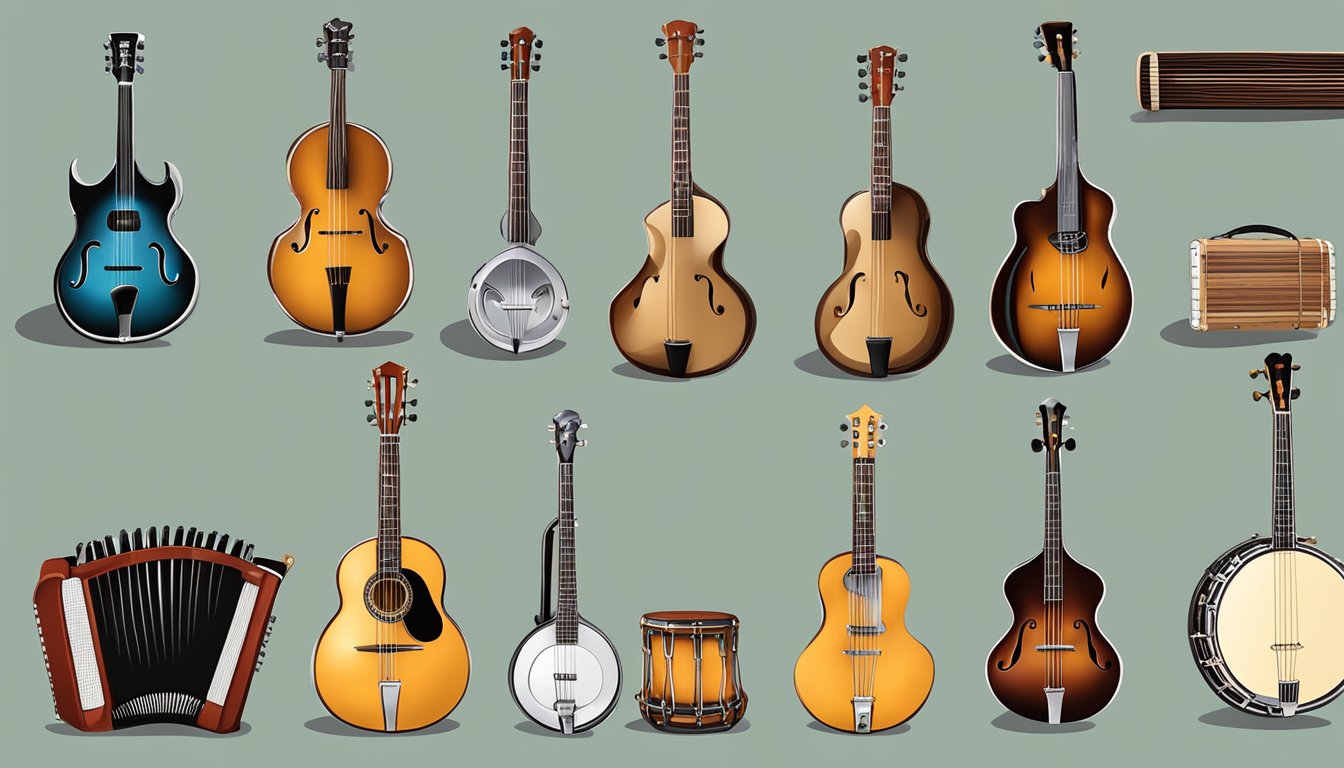
String Instruments
In Roots music, string instruments play a crucial role in creating the distinctive sound of this genre. The acoustic guitar is a popular choice for musicians due to its versatility and ability to produce rich, warm tones. The banjo, with its characteristic twang, lends a unique flavor, particularly to bluegrass and folk music styles. Similarly, the mandolin adds a bright, chiming sound that complements the other string instruments. For a more traditional and rustic touch, the fiddle, closely related to the violin, helps evoke the feel of early Americana. The dobro and dulcimer are other important string instruments, with the dobro being a resonator guitar and the dulcimer a fretted, plucked instrument.
Percussion Instruments
Percussion instruments provide the rhythmic foundation of Roots music. The drums are an essential component in the ensemble, giving a solid beat and adding a dynamic range to the music. The upright bass, on the other hand, serves a dual role in the band by supplying a steady rhythm and contributing to the melodic structure through its low-end tones. Another noteworthy percussion instrument is the washboard, which creates a distinctive rhythmic texture and enhances the authenticity of the Roots music sound.
Wind Instruments
Roots music incorporates various wind instruments, adding layers of expression and emotion. The harmonica is a small, handheld instrument that produces expressive, melodic lines, imbuing the sound with a soulful, blues-inspired tone. The accordion is another popular option, often used in folk and zydeco subgenres, lending a versatile, rhythmic, and melodic element to the mix.
Other Musical Instruments
Roots music also incorporates a few less common, but equally important, instruments musical instruments outside the string and percussion families. The dulcimer is a stringed instrument whose sweet, delicate sound complements the other instruments. The upright bass is used frequently for its low, resonant tone and solid rhythmic foundation. Incorporating these instruments together results in the rich and diverse soundscape that characterizes roots music. These instruments, along with others mentioned earlier, contribute to the rich, diverse tapestry that makes up the unique soundscape of Roots music.
Prominent Musicians and Bands
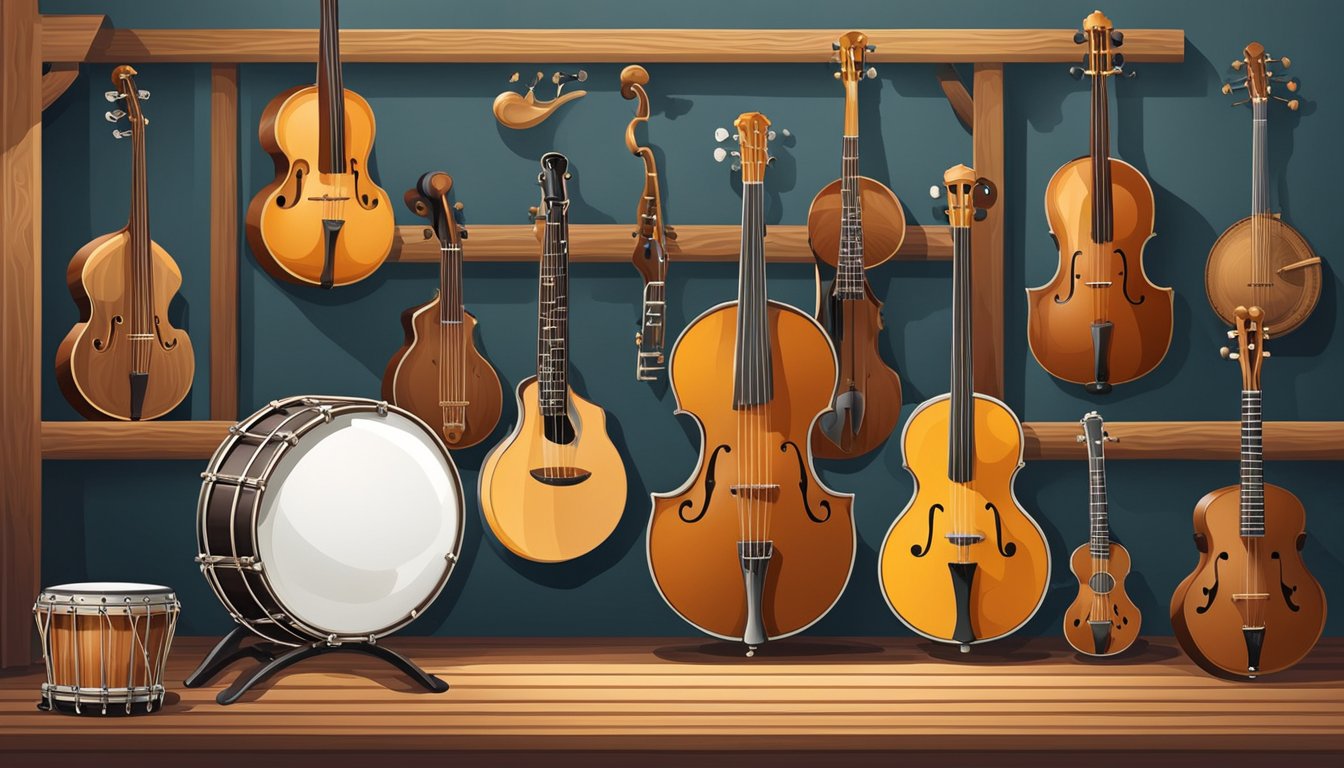
Early Influential Artists
Roots music has a rich history, with many early influential artists paving the way. Woody Guthrie and Pete Seeger played crucial roles in the development of folk music with songs focusing on social issues and workers’ rights1. The Carter Family and Hank Williams were pioneers in country music, while Bill Monroe is known as the “Father of Bluegrass”2. Other notable artists in this genre include Doc Watson, Johnny Cash, Willie Nelson, Bob Dylan, and Emmylou Harris.
Folk and roots music also saw significant contributions from female artists, such as:
- Joan Baez
- Buffy Sainte-Marie
- Judy Collins
- Alison Krauss
- Gillian Welch
- Lucinda Williams
These women brought their unique talents and perspectives to the genre.
Modern Contributors
In recent years, new artists have continued to develop and expand the roots music genre. Modern contributors such as Brittney Spencer infuse traditional roots elements with contemporary sounds and styles. Additionally, bands like The Byrds and The Kingston Trio have helped popularize this genre by blending folk, rock, and country influences3.
Other contemporary folk and roots musicians worth mentioning include:
- Gordon Lightfoot
- Arlo Guthrie
- The Weavers
These modern artists have successfully carried on the tradition of their predecessors while also pushing the boundaries of what roots music can be.
As a fan of roots music, exploring the works of these prominent musicians and bands will enrich your understanding of its history, variety, and innovations. So, pick up an album or attend a live performance to immerse yourself in the captivating world of roots music.
The Significance of Songs and Albums
The world of roots music is vast, with a rich history of songs and albums that exemplify its various genres. From traditional ballads to modern renditions, these pieces of music have captured the essence of American culture and heritage. In this section, we will explore some iconic songs and albums that define roots music and highlight its significance.
Songs that Define Roots
While numerous songs could be considered quintessential roots music, a few stand out for their cultural impact and timeless appeal. One such example is the haunting ballad, Barbara Allen. With roots in both the British Isles and America, the song has been a staple in folk music for centuries, demonstrating the lasting power of simple storytelling through song. Considered one of the earliest popular ballads, Barbara Allen showcases the emotional depth, poignancy, and universality characteristic of roots music.
Similarly, roots music also encompasses genres like blues, country, and early rhythm and blues. Songs like Robert Johnson’s Cross Road Blues paved the way for modern blues, whereas Woody Guthrie’s This Land Is Your Land serves as a powerful political statement in American folk music. These songs exemplify the heart and soul of roots music and offer moving accounts of the American experience.
Iconic Albums
Over time, several albums have emerged as definitive representations of roots music. They capture the essence of their respective genres and build upon the foundations laid by the genre’s pioneers. A prime example is Bob Dylan’s seminal album, The Freewheelin’ Bob Dylan. With its fusion of folk and blues, this album explores timeless themes like love, war, and social justice, accurately conveying the spirit of roots music.
Other notable albums include Appalachian Spring by Aaron Copland, which celebrates the folk traditions of the Appalachian region, and O Brother, Where Art Thou? soundtrack, a tribute to American roots music that showcases bluegrass, gospel, and traditional country tunes. By encompassing various styles and themes, these albums have not only left an indelible mark on roots music history but also continue to inspire countless artists today.
Influence on Modern Music
Impact on Americana
Roots music has played a significant role in shaping the genre of Americana. Derived from various traditional American musical styles, such as country, blues, and folk, Americana combines these elements to create a sound that is both fresh and nostalgic. This genre, known for its powerful storytelling and authentic expression, pays homage to its roots music origins while adapting to contemporary tastes and incorporating modern influences.
Alternative Country and Roots Rock
Alternative country and roots rock are genres that have been significantly influenced by roots music. Drawing from the traditions of country and folk, alternative country offers a unique take on the classic country sound. Strong themes of rebellion and individualism can be found in this genre, connecting it to the punk movement. Roots rock, on the other hand, fuses elements of rock and roll with folk, blues, and country in a fresh and innovative way. Both genres have broadened the reach and exposure of roots music in popular culture.
Influence on Mainstream Pop and Rock Music
Roots music has not only given rise to genres like Americana, alternative country, and roots rock but has also been highly influential in mainstream music. Many pop and rock artists have embraced the honest emotion and powerful storytelling often found in roots music, incorporating these traits into their own music.
For instance, folk rock emerged in the mid-20th century as musicians like Bob Dylan and The Byrds blended traditional folk music with rock and roll, creating a style that resonated with a wide audience. This blend of roots music and rock has maintained a persistent presence in popular music to this day, as new artists continue to embrace and draw influence from these styles.
In conclusion, roots music has been essential in shaping various modern genres, from Americana and alternative country to pop and rock. Its influence can be heard in the authentic storytelling, raw emotions, and genre-bending elements present in today’s popular music.
Roots Music in Media and Culture
Roots music has left a significant impact on media and culture, gaining attention from influential organizations and documentaries. In this section, we will explore roots music’s representation in PBS programming, the Library of Congress’ documentation efforts, and Ken Burns’ documentary on the subject.
Roots Music on PBS
PBS, a renowned public broadcaster in the United States, has played a significant role in showcasing roots music. They have produced and aired numerous programs that highlight this genre, allowing audiences to immerse themselves in the stories and sounds of American roots music traditions. Through engaging content, PBS continues to foster an appreciation for the authentic, culturally rich music that roots represent.
Library of Congress Documentation
The Library of Congress has made substantial efforts to document and preserve various elements of roots music in its archives. Their American Folklife Center contains vast collections of recordings, photographs, and manuscripts, including field recordings of blues, gospel, and folk musicians. These resources serve as invaluable research tools for scholars and enthusiasts, who can delve into America’s vibrant musical history. By preserving these materials, the Library of Congress ensures the legacy of roots music lives on for future generations.
Ken Burns Documentary
Ken Burns, a celebrated filmmaker, has produced a noteworthy documentary highlighting roots music’s significance in shaping American culture. His work showcases the connections between various musical genres, exploring their origins, evolutions, and influence within the broader music landscape. With an emphasis on storytelling and a carefully curated selection of music, Burns’ documentary successfully conveys the rich tapestry of roots music and its importance in understanding the shared American experience.
Roots Music and Community
Roots Music in the Southern United States
Roots music, a term often used to describe various traditional music genres, finds its origins deeply rooted in the Southern United States. Folk, blues, country, and gospel are just a few examples of the musical styles that make up roots music. As you explore this genre, you’ll discover a sense of community and shared history that is vital to its identity and preservation.
International Bluegrass Music Association
Organizations like the International Bluegrass Music Association play a significant role in promoting and preserving roots music. By supporting community events and providing opportunities for artists, they showcase the rich cultural heritage and diverse influences that shape this music genre, subsequently strengthening the unity and bonds among its members.
Storytelling and Improvisation in Roots Music
A central aspect of roots music is its emphasis on storytelling and the oral tradition carried through generations. These musical narratives often focus on the experiences, hopes, and challenges faced by everyday people. By incorporating improvisation, roots artists keep stories alive, making their music a living, breathing entity that evolves and adapts to the times, yet maintains the essence of its cultural origins.
When experiencing roots music, you’ll find yourself immersed in the spirit of community, driven by the power of storytelling and improvisation. By exploring the genre’s rich history and vibrant culture, you contribute to the ongoing preservation and celebration of the traditions that make up the foundation of roots music.
Final Thoughts
Often including folk, blues, country, gospel, spirituals, and other forms of traditional music, roots music allows you to explore the rich history and stories behind various cultures and communities.
As you delve deeper into roots music, you’ll find that it is characterized by acoustic instrumentation, merging of various musical styles, and poignant lyrics. With its origins in early European and African culture and history, roots music captures the essence of people from different cultures and backgrounds, painting vivid pictures of their experiences and hardships.
By embracing roots music, you not only gain an appreciation for its unique sounds and styles but also develop a deeper understanding of the history and influences behind the music. As a listener and a fan, you’re able to connect with the stories and emotions depicted in the music, fostering an appreciation for the artists and the timeless traditions they carry forward.
Always remember that the essence of Roots music lies in its ability to connect you with the people, communities, and cultures behind it. As you continue on your journey to explore and enjoy this diverse and captivating genre, let the sounds of roots music open your heart and mind to the rich tapestry of human experiences and stories.
Footnotes
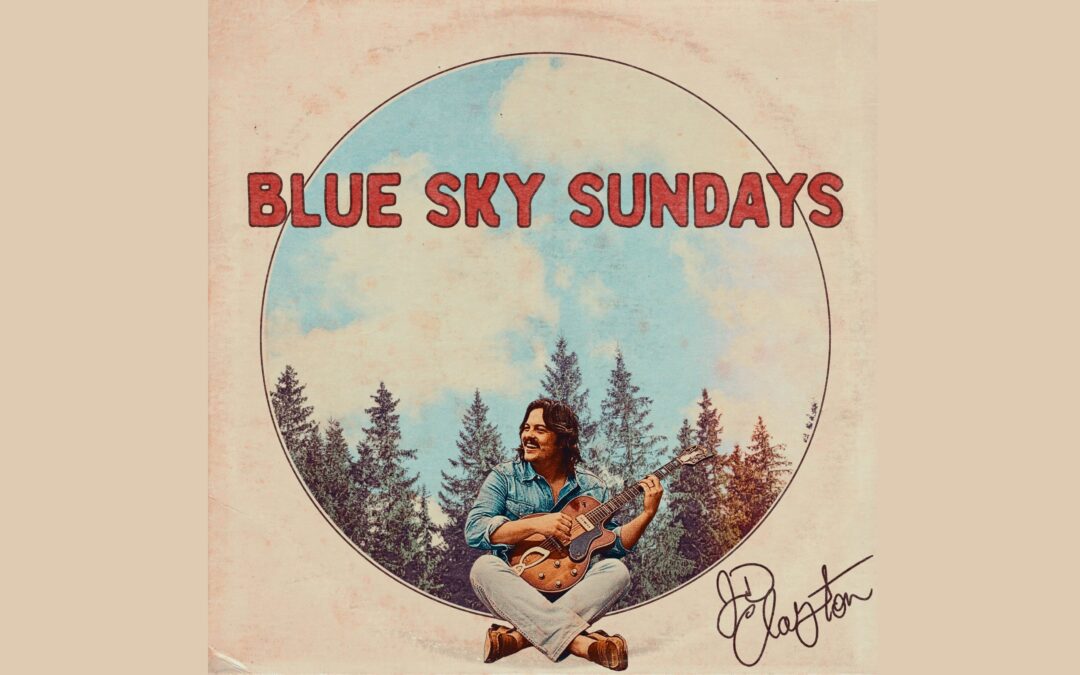
‘Blue Sky Sundays’ – JD Clayton – New Album Review
JD Clayton returns with Blue Sky Sundays, his follow-up to the critically acclaimed 2023 debut, Long Way from Home. This time, he steps into the role of producer, serving up a rich slice of Americana that blends country rock and bluesy roots with even greater depth....
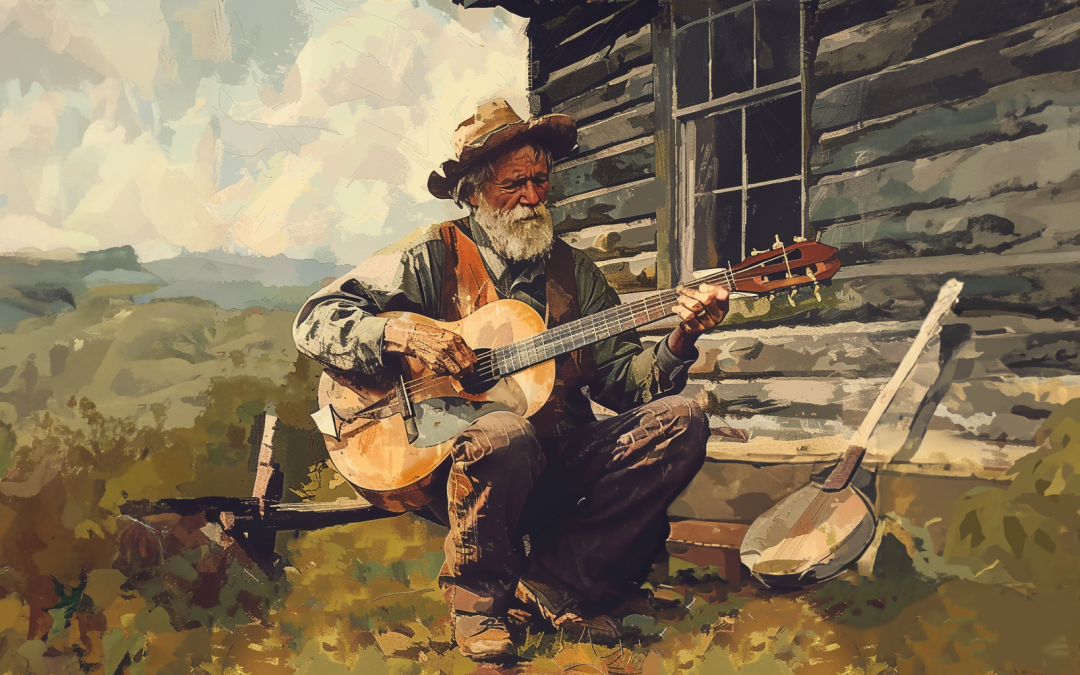
The Roots of Appalachian Old-Time Music: Exploring its Historical Origins
The Appalachian Mountains echo with the soulful strains of old-time music, a genre deeply rooted in America's diverse cultural tapestry. This traditional art form, born from a fusion of influences spanning the British Isles, African rhythms, and American blues,...
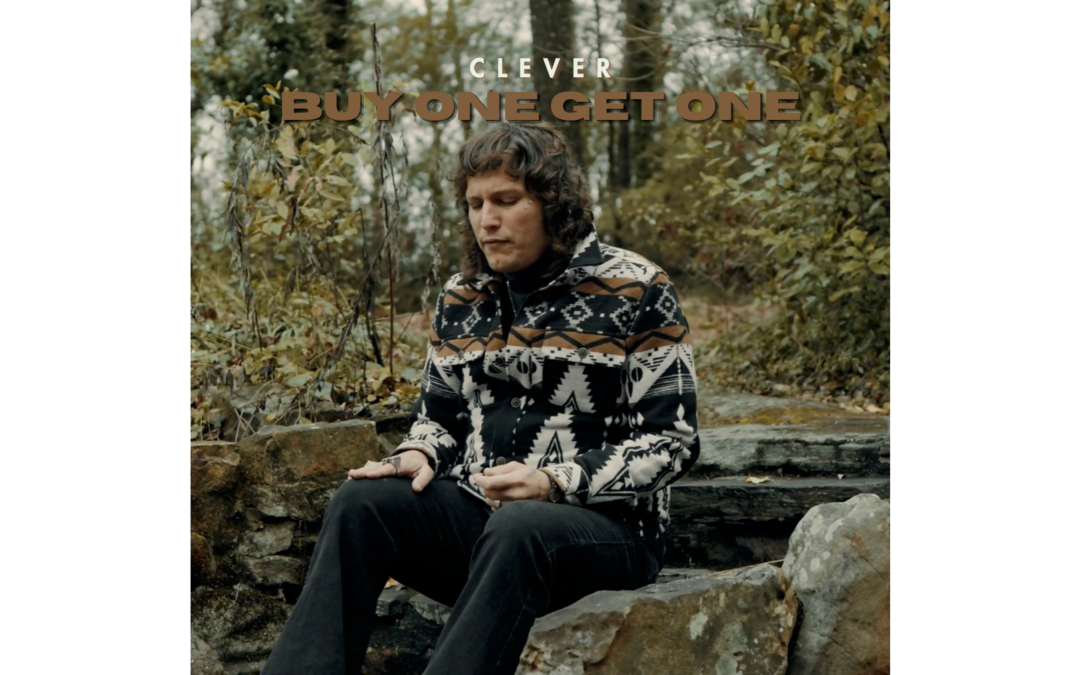
Clever Releases New Single: ‘Buy One Get One’
Clever, the Alabama-born singer-songwriter known for his emotive lyrics and genre-blending style, has just dropped his latest single Buy One Get One. The small-town wordsmith turned country troubadour, doesn't mince words in this earthy ballad. Buy One Get One ain't...

Vincent Mason Releases Latest Single: “Waitin’ On You To Wear Off”
Country music sensation Vincent Mason is kicking off 2025 with a bang, releasing his latest single Waitin' On You To Wear Off on January 10th. The new track, written with Colton Venner and Jack Hummel, showcases Mason's signature style that has captivated fans across...
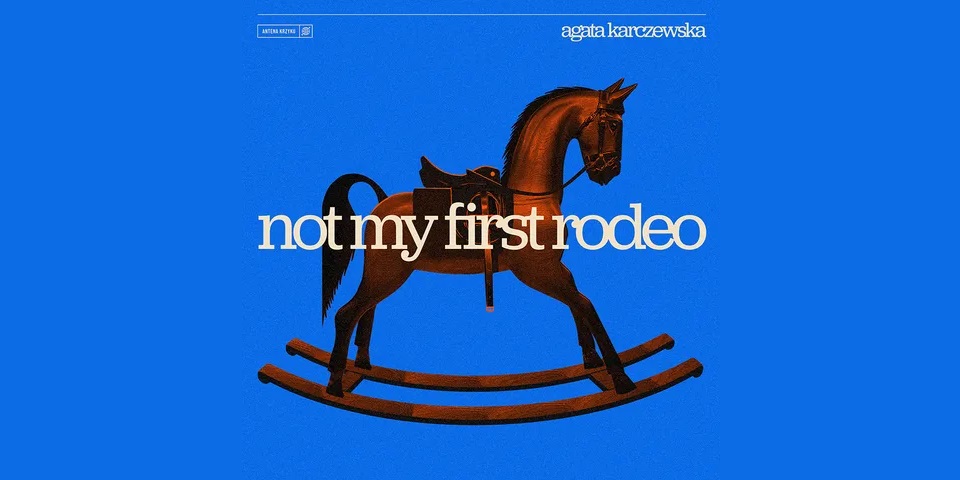
Not My First Rodeo – Agata Karczewska – New EP Review
For those unfamiliar—though frankly, it feels almost criminal to admit it—Agata Karczewska is a Polish singer-songwriter who has been quietly but powerfully carving out her space in the folk-Americana scene. Karcewska has realeased her long awaited EP Not My First...

‘The Sun Still Rises’ – Aisha Badru – New Album Review
The Sun Also Rises is Aisha Badru’s second full-length album, following 2018’s Pendulum and four (!) EPs released since then. As a singer-songwriter from New York City, Badru brings her distinctive voice to the forefront of this record. I haven’t listened to any of...
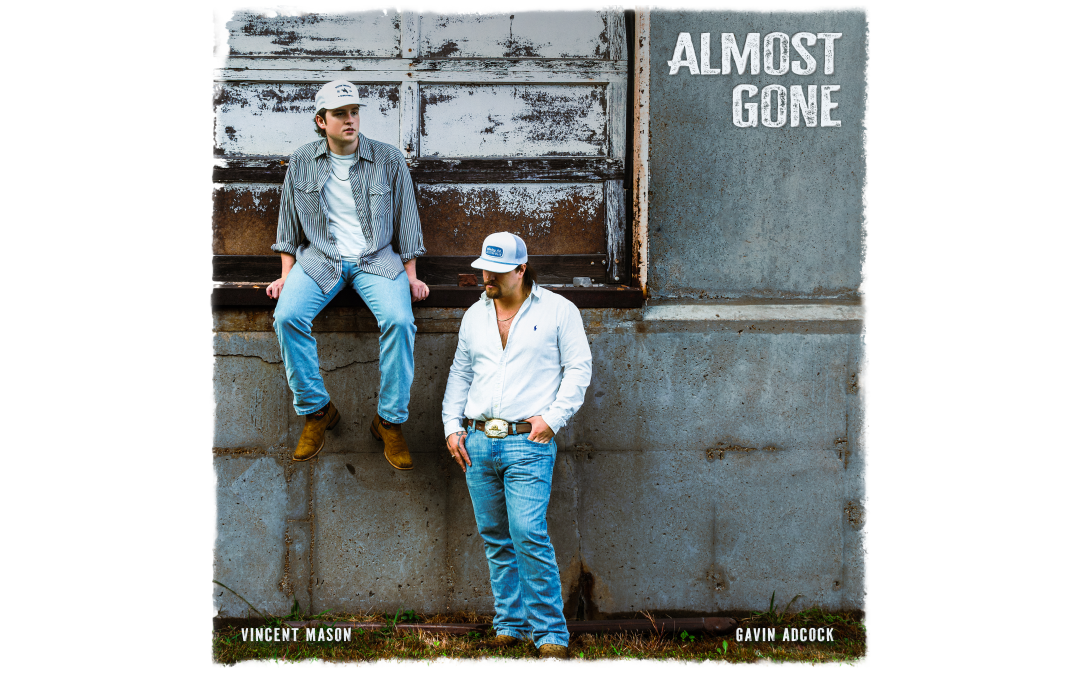
Vincent Mason and Gavin Adcock Release New Single: ‘Almost Gone’
Vincent Mason and Gavin Adcock have just released their new single, Almost Gone. Produced by Jay Rodgers, this heartbreak anthem brings together two rising stars in a collaboration that showcases their undeniable musical chemistry. The emotionally charged track blends...

JD Clayton Releases New Holiday Classic – ‘Your Favorite Christmas Song’
For Arkansas-born singer-songwriter JD Clayton, the holiday season holds a special place in his heart. “Christmas is hands down my favorite time of year,” he shares with a warm smile. “I’ve probably watched White Christmas at least fifty times every holiday season. My...

Vincent Mason Released New Single: ‘Speak of the Devil’ (w/Review)
Vincent Mason, the rising star in country music, has just released his latest single, Speak of the Devil. At just 23 years old, Mason has already made waves in the industry, with his breakout hit Hell Is A Dance Floor racking up over 60 million streams. His raw talent...
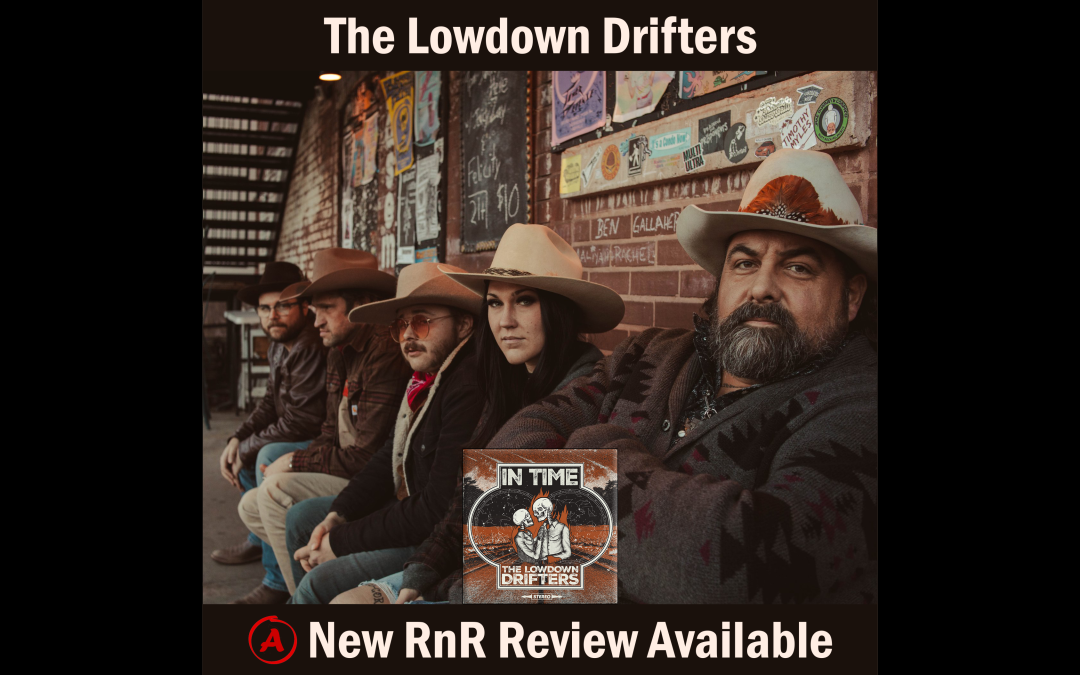
‘In Time’ – The Lowdown Drifters – New Album Review
After nearly a decade of cutting their teeth on the gritty stages of backyards and barrooms, The Lowdown Drifters are making serious strides toward Americana roots prominence with their latest release, In Time, which dropped on October 25, 2024. Hailing from Ft....
Related Articles
‘Blue Sky Sundays’ – JD Clayton – New Album Review
JD Clayton returns with Blue Sky Sundays, his follow-up to the critically acclaimed 2023 debut, Long Way from Home. This time, he steps into the role of producer, serving up a rich slice of Americana that blends country rock and bluesy roots with even greater depth....
The Roots of Appalachian Old-Time Music: Exploring its Historical Origins
The Appalachian Mountains echo with the soulful strains of old-time music, a genre deeply rooted in America's diverse cultural tapestry. This traditional art form, born from a fusion of influences spanning the British Isles, African rhythms, and American blues,...
Clever Releases New Single: ‘Buy One Get One’
Clever, the Alabama-born singer-songwriter known for his emotive lyrics and genre-blending style, has just dropped his latest single Buy One Get One. The small-town wordsmith turned country troubadour, doesn't mince words in this earthy ballad. Buy One Get One ain't...

